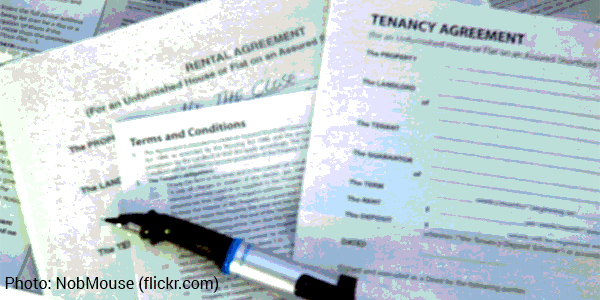Which agreement?
30/03/2017
 People who live in residential land lease communities do so under an agreement or contract. The Tenants’ Union and Tenants Advice and Advocacy Services are frequently asked questions about agreements. Since the laws changed in 2015 the number and variety of questions have increased. In this article we discuss the types of agreements used in land lease communities and how the laws apply to those agreements.
People who live in residential land lease communities do so under an agreement or contract. The Tenants’ Union and Tenants Advice and Advocacy Services are frequently asked questions about agreements. Since the laws changed in 2015 the number and variety of questions have increased. In this article we discuss the types of agreements used in land lease communities and how the laws apply to those agreements.
Tenancy agreement
A person who rents a home in a land lease community (a tenant) has a tenancy agreement under the Residential Tenancies Act 2010 (Tenancies Act) unless they have an arrangement that is excluded by that Act. Arrangements excluded from the Tenancies Act relate to holiday or crisis accommodation and full time employees of the operator.
A tenant may have a tenancy agreement with the operator or with another person who owns the home. The owner of the home is the landlord and, no matter who that is, the Tenancies Act applies to the agreement.
Site agreements
Someone who owns their home and rents only the site has a site agreement under the Residential (Land Lease) Communities Act 2013 (RLLC Act). This agreement is between the home owner and the operator of the community.
Occupation agreements
Occupation agreements are granted under the Holiday Parks (Long-term Casual Occupation) Act 2002. These agreements are for people who own a moveable dwelling in a land lease community that is used only for holiday purposes. People with occupation agreements have a principal place of residence somewhere other than the community.
Oral agreements
A phrase commonly heard by Tenant Advocates is ‘I don’t have an agreement’. What this really means is ‘I don’t have a written agreement’ because everyone who lives in a land lease community has a type of agreement or contract. Oral tenancy and site agreements are still covered by the law.
The Tenancies Act and RLLC Act both require the agreement to be in writing and for the tenant or home owner to be given a copy free of charge. It is an offence for the landlord or operator not to provide a written agreement but it still happens. The law says that if you don’t have a written agreement then the standard form agreement under the relevant Act applies to you.
Tenancy laws prescribe standard form agreements and they can be found in the regulation made under the applicable Act. The law requires a landlord or community operator to use the prescribed agreement.
If you don’t have a written agreement and are therefore unsure about the terms of your agreement, contact your local Tenants Advice and Advocacy Service – they can provide free advice to help work out which agreement applies to you.
Example
A home owner who moved into a land lease community in 2012 (who doesn’t have a written agreement) has a standard form residential site agreement prescribed by the Residential Parks Regulation 2006. The Residential Parks Act 1998 was the applicable law at this time.
Additional terms
As we have mentioned, operators and landlords must use prescribed standard form agreements but they can add additional terms to those agreements. The additional terms must not contravene the applicable Act and must not be inconsistent with any of the terms in the standard form agreement. This means that if the Act or agreement provides a right, the additional terms of the agreement cannot take that right away.
What is I have an old agreement?
The Residential (Land Lease) Communities Act 2013 commenced on 1 November 2015 and that means that thousands of land lease community residents have agreements that were signed under a different law. The RLLC Act still applies to site agreements that were entered into before 1 November 2015, and the Tenancies Act applies to tenancy agreements entered into before that date. There is no need to enter into a new agreement.
When the law changes the new Act has provisions setting out how it applies to contracts that are already in place. When the RLLC Act came into force it made some retrospective changes to site agreements as well as protecting those on old agreements from some of the new provisions.
One of the retrospective changes made by the RLLC Act is that every home owner now has the right to sell their home on-site. Some old agreements may contain terms that prohibit the sale or restrict it in some way but those terms are now void.
Operators can also no longer require home owners to take out any form of insurance, including public liability insurance. It is always wise to insure your home and contents but you now make that choice, not the operator. This means that you do not need to provide copies of your insurance certificates to the operator – your insurance is your business.
The RLLC Act enables operators to levy some new charges, for example sewerage usage charges, but those on old agreements are protected and do not have to pay those charges. The charges only apply to home owners on new site agreements signed under the RLLC Act.
Free advice
This article is an overview of agreements and the law in land lease communities. If you have a specific question about your agreement you can get free advice over the phone from your local Tenants Advice and Advocacy Service. Your call will be confidential and obligation free.
Click here to download a pdf of Outasite Lite 28
